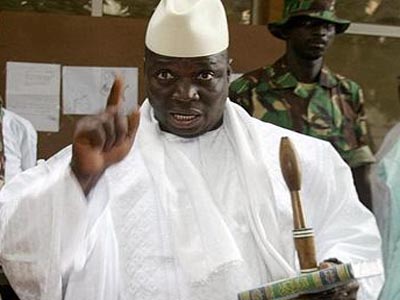Gambia’s President Declares State Of Emergency
He decried “extraordinary” foreign interference in his country’s affairs and December’s election.
Regional leaders have been unsuccessfully trying to persuade Mr Jammeh to hand over power to Adama Barrow, who won the polls.
The move comes after Nigeria deployed a warship to put further pressure on Mr Jammeh to step down.
Regional bloc ECOWAS, the Economic Community of West African States, has prepared a Senegal-led force but maintains that military intervention would be a last resort.
In his televised announcement, Mr Jammeh said “any acts of disobedience to the laws The Gambia, incitement of violence and acts intended to disturb public order and peace” are banned under the state of emergency.
He said security forces were instructed to “maintain absolute peace, law and order”.
Earlier, the National Assembly passed a motion condemning what it called the “unlawful and malicious interference” of the African Union and the country’s neighbour, Senegal, in The Gambia’s affairs.
Mr Barrow, a property developer, is meant to be inaugurated as the new president on Thursday. His spokesperson expressed shock and sadness at the declaration, says the BBC’s Umaru Fofana in Banjul, the capital.
It is remains unclear if a curfew is being imposed, our correspondent says.
Mr Jammeh initially accepted the election results but then decided he wanted them annulled after the electoral commission admitted some errors, although it insists this did not affect the final outcome.
The Supreme Court is unable to hear the challenge until May because of a shortage of judges, and Mr Jammeh has said he will not step down until then.
At least three Gambian ministers, including the foreign minister, have resigned in recent days. Thousands of Gambians have also fled to Senegal, and further afield to Guinea-Bissau, amid fears of violence.





